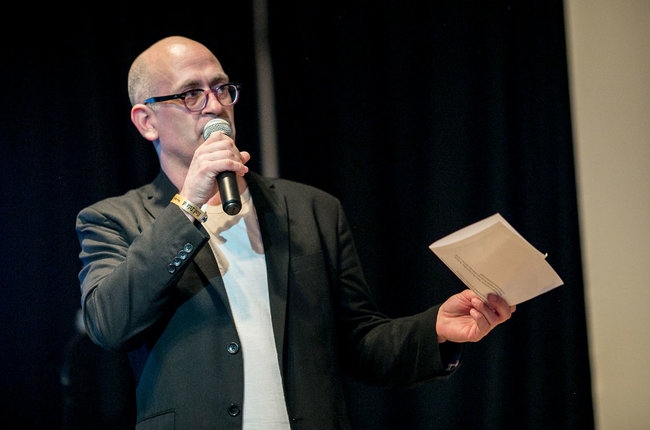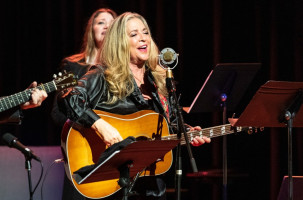Polaris Music Prize began 12 years ago as a singular artistic merit award for the Canadian album of the year, founded by former A&R guy Steve Jordan and voted on by the selected music media. The monetary value of the prize is now $50,000 CAD ($41,000 USD). Each of the nine runners up receive $3,000 ($2,460), and all 10 shortlisted acts are presented with a limited-edition poster of their album interpreted and created by a visual artist.
While the prize -- which will be awarded tonight (Sept. 18) at Toronto’s The Carlu, as determined by an 11-member grand jury behind closed doors while the gala dinner is in progress -- is the flagship of the not-for-profit, Jordan’s goal is to make it a year-round venture.
Under the umbrella of the Polaris Music Prize, there is now The Slaight Family Polaris Heritage Prize, honoring Canadian albums from four time periods (1960-75, 1976-85, 1986-85 and 1996-05). Polaris has also co-presented shows/events, such as Canada 150 in London at Trafalgar Square and an Owen Pallett/Tanya Tagaq show at Toronto’s Massey Hall. There have been salons and panel discussions held across the country with Polaris jury members (there are about 200 jurors who vote on the long and short lists); collaboration sessions, such as Buffy Sainte-Marie and Tanya Tagaq recording “You Got To Run (Spirit of the Wind);”and Holy Fuck and Shad, a.k.a Holy Shad, cutting “The Legend of Cy Borg;” cover sessions of past nominees recording fellow past nominees, released on YouTube; and a podcast about various aspects of Polaris with new episodes hosted by Jordan.
Polaris also has two full-time staff, Aaron Brophy, head of communications; and interim events manager Meghan Borthwick, who -- along with Jordan -- work out of Blue Ant Media, Polaris’ production partner.
Billboard spoke with Jordan about the creation and evolution of Polaris and where he sees it going, as well as his challenge to the Canadian music industry to add more women to its boards.
Billboard: What were you doing before you started investigating launching this prize?
Steve Jordan: I had been let go from Warner, and was dabbling in some management unsuccessfully and was looking for something to do that would motivate me. That’s about the time that I had this idea. When I went to do A&R at True North, when I interviewed with Bernie [Finkelstein], I told him this was an idea I still wanted to work on and he was okay with that. So hats off to Bernie for letting me dabble.
As a guy who’s been involved with music since you were a teenager and into university where you did a radio show, what was your view of award shows?
I loved them. I was fascinated by them and especially the performance aspect. We all saw Michael Jackson do the moonwalk at the Motown celebration. ‘There’s a musical moment happening here.’ I think that influenced what we try to do at the Polaris show. It’s not just about artists going up and giving a perfunctory performance, it’s about ‘We’re celebrating something. This is really special. Let’s inject that into the performance, like there’s actually something at stake.’ I saw a lot of bullshit awards shows too [laughs]. Just like everybody on Twitter nowadays is like, 'That was awesome. That was bullshit.' Everybody picks it apart. I would do the same thing, I remember watching very early Junos, as well too, being able to delineate the stuff that was awesome and truly momentous and the stuff that was truly drivel and awful.
We have a lot of awards in this country. America does too, whether they’re singular prizes or entire genre or multiple categories. What was your initial thinking for a singular prize just for an album and how it would be determined?
I think the impetus came from following the [U.K.’s] Mercury Prize, and being struck by the effectiveness of knowing their methods. There would be a few international acts on there who you would recognize, and there would be a bunch of stuff you didn't know, and because they were all presented together, there was an implied merit to the things you didn't know and so The Bees is still one of my favorite British bands, having discovered them on the Mercury Prize shortlist and that’s when the light bulb went off for me. 'Hmm, there’s enough stuff even on an indie level that is recognized around the world, that by association if we put these things on a shortlist, it should help.'
You staged the first one in 2006 and it went off tremendously. Final Fantasy/Owen Pallett won the first one for He Poos Clouds. So there’s a cool exceptional talent that wins. What was the first Polaris offshoot idea?
The posters we did right from the get-go and that was influenced by going to Flatstock at SXSW which was a poster art show with gig poster designers from around the U.S. I think there was a few international ones too. I was uninspired about any sort of sculpture ideas or trophies. That was when it just dawned on me, we should just get 10 different artists to do 10 different pieces of art and have their interpretation of it. That’s really interesting when you get another creative interpreting somebody’s work, kind of like music videos, but with the gig posters. Same idea. Super lucky that we had that idea in the first year.
About four years in, you started salons, public discussions about Polaris.
The salons, some have been successful, some haven’t. They were more about presenting Polaris for what we think it is, which is more about a conversation about music than an award with winners and losers. So taking that to the people, but they ended up just being more informational and panel discussions. It’s as much about the people who follow what we do, as it is about what we’re presenting to them. It’s great and very vital to get people’s feedback on what we’re doing and how were doing it.
No one hears the discussions behind closed doors by the grand jury, which is an intense, studied, intelligent discourse about the albums. Many people feel that music criticism is a lost art. Polaris brings back critical thinking and encourages discussion all year on the private jury forum.
What we do with Polaris which is different than some of the other arts prizes or the Mercury Prize, and it was one of my early objectives was to pump up music journalism. The film critic, for instance, can make or break an opening week for a film sometimes. If the reviews are lousy and then they don’t send out advanced screeners because the buzz isn’t good, the studios try to work around that. When I was doing A&R, some of my most trusted A&R sources were music journalists. I was told about Tegan and Sara first when I worked at Warner from a music journalist. I was told about The Dears and Broken Social Scene from a music journalist. So I feel like it should be a trusted source for everyone, and that music journalism in this country was not taken as seriously. So obviously because, like you said, reviews are dying or dead, at least album reviews, just arts coverage in general is in jeopardy, I still don’t want to give up the notion that people who filter music on a regular basis have very interesting methods and they all differ, and their tastes differ, and to expose those, I find is super interesting.
Are the public Polaris salons and panels still going?
No, because I was finding that a lot of people were just coming out just to find out what Polaris was, and the people who really participated in the conversation were doing that more online, or privately. So they became just informational. We don’t do them anymore.
More recently, in the past few years, you’ve added Polaris co-presents, like the concert at Trafalgar Square in London this summer for Canada 150 and Live at Massey Hall with Tanya Tagaq and Owen Pallett in December 2015. You started the studio cover sessions and collaborative recordings, and just last year the podcasts.
We had no grand plan when we started. Our grand plan was just to stick around and try not to die [laughs] and things sort of stabilize for us, in terms of organizationally and financially, then you could start to look to the future and go, ‘What is it that we want to do?’ and we decided that because the conversation amongst jurors happens year-round, and people who love music talk about music all the time, obsessively, that we should try and do some things that extended the life of Polaris beyond just the summers between the long list and the winner. So it’s all about increasing the presence of what we do year-round.
We started cover sessions, and even the collaboration sessions, they’re more about presenting Polaris as much of a society of mutual-appreciating artists more than a competition. That’s what those things were about, and then the podcast we just started last year. We’re very excited about that. There aren't a lot of music podcasts in Canada or even in general. That will continue to be something that exposes more music. We just did an episode for the longer list for instance, and shows the conversation and showcases our jury members’ tastes, and we’re really excited about it. Lana Gay was our host and she was really great. We just made a decision this year that it’s best served if the Polaris guy is the host of the podcast.
The Heritage Prize is now in its third year.
It’s a way to engage some older music fans and bring them into our world a bit. They might see a Blue Rodeo or Tragically Hip record on a shortlist and then go, ‘What is this Polaris thing?’ It’s also just a gold bar conversation with my friends -- what would have won before Polaris.
Will you be presenting or producing any more concerts?
We’ve been asked to do shows for years, we tend to turn it down. Sometimes I think it’s better off just to let artists who’ve been nominated for Polaris use that to their advantage if it helps them. So we let people freely publicly associate with us. It just seemed to be counterproductive to actually do that in a festival setting.
So you don’t ever want to have a Polaris line up or the artists from the shortlist to do a full Canadian tour?
The thing is, most agents or most people who represent artists want to get the best festival positioning and slot for their artists and kind of put them all on a Polaris stage sort of negates that a little bit. I think there’s a bit of that going on. Never say never, but it’s also a tremendous amount of work doing live events, and I don’t that were even equipped to do that. The Canada 150 show we did was very successful, but a huge challenge, while we’re also trying to set up for the gala ‘cause that’s when that starts.
I guess a Polaris Music Festival would go against the idea of Polaris, which puts all 10 artists on the same level playing field. So how on earth would you order the lineup. Who would go on first and who would headline?
Exactly. There’s obvious business factors that come into play when you’re booking a festival, and what Polaris wants to present is music, regardless of how popular someone is, so we just want to program it musically.
You’re also a not-for-profit right and you’re supposed to be unbiased.
Exactly, and so once you get into it, you’re like, ‘Why did they pick this band and not that band? They all should be equal.’ And that’s a valid point. The opportunity with the High Commission in London [at Trafalgar Square], the line-up was partly directed by them in terms of what they wanted to see. We had leeway to put artists on that bill who might be a little bit challenging to a larger audience like Tanya Tagaq, but they let us do it. So those are the kind of things that I’d like to see us do more of potentially, but I think opportunities to program like that with that kind of freedom are rare.
Lastly, when you received your Unsung Hero Award at the Canadian Independent Music Association (CIMA) Gala in June, you made a point in your speech to ask everyone to join in a “shared goal to commit to include and empower women and marginalized communities on your boards and in your organizations." You said that you had set the target for the Polaris board and jury to make it 50 percent female within two years. You had a captive audience of industry leaders and you seized the moment.
The CIMA thing was interesting but I’m not entirely comfortable with me being the focus of that attention and it’s a little reductive to apply the achievements of Polaris to just one person because so many people helped build it. And we had already decided that we were going to move towards the things I announced. Initially we didn’t want to be public with that so much. We just wanted to do it because it was the right thing to do, but then I thought, 'I'm going to have a room full of both old-school and new-school industry.’ I had had some chats at our board level, just about the whole idea of trying to make things more representative, and these are guys like Kim Cooke and Jack Ross, who are totally amazing people -- and this was back months ago, Jack’s not on the board anymore -- and initially they were resistant. When I explained to them why it needed to be done, they were on board, and I thought, If I could turn these two veteran taciturn dudes with just a simple explanation, I think maybe we could do this with a whole room of industry as well too.
[Four of 18 on CIMA’s executive board and directors are women; two of SOCAN’s 18 board members; and one of 11 on CARAS board of directors, for example).
What’s the resistance?
There’s a general thought that the people with merit get the gigs, and get the appointments. Again, this was a discussion at one of our board meetings and it was a reaction to Grime’s statement about some Juno nominations, and they were bemoaning the fact that it’s open to anyone, anyone can apply, and I said, 'Just because anyone can apply, doesn’t mean anyone does apply, and men have dominated the spaces for so long’ -- and I think if I didn’t have this example to support my arguments, it might have been tougher -- but for our jury, for instance, we take applications. Finally had it, like a couple of years ago, looking at our applications and they were 90 percent men, and I said that there has to be more women doing stuff, but by and large have been so frustrated, they just kind of give up trying to be taken seriously in male dominated spaces. So I said, 'We have to go out and ask them. We have to go find them. We actually have to make an effort,' and that’s just the simple fact of it.
And the next year, our jury applications by women and people of color and other areas, if you go and recruit, just go make the effort and do a little bit of work it’s all there. That’s the example I used with those guys. The targets are also for our jury as well too, I was reluctant to announce it in any official way because I didn’t want to make it look like we were trumpeting the fact that we were doing something that should be done -- and who the hell knows if I’ll get nominated for another thing ever again -- so I was like, ‘I’m gonna use my pulpit a bit, and let people know what we’re doing, and let people know that it can be done’ because I think people’s first reaction is well, ‘It’s just so hard,’ and it’s actually not that hard. Just decide you’re gonna do it.
I certainly know many intelligent, accomplished women in the music business.
There’s no lack of women doing it. Hopefully what happens is when the people who are in positions of power open up their spaces, it will do the exact thing that they say isn’t there, which is to encourage more women to take that chance and to step forward.
And did you get any feedback after your speech?
Yeah I got a lot. I got more feedback than I was expecting, I didn't really do it in that speech to get a reaction or get supported or praised. I was just like, ‘Here’s what we’re doing; you can do it too.’ I got a lot of emails and phone calls. Even that night, there was a lot of people saying, ‘Thank you.’ It’s very easy to go talk about yourself at those things. I’m not comfortable doing that because, again, what Polaris represents and what we do is such a family affair, a group effort, there’s so many people involved, and so many contributions that people make. Being the person in charge, that’s just the role that needs to be played, and the other roles are just as important. So we got a lot of great feedback.








